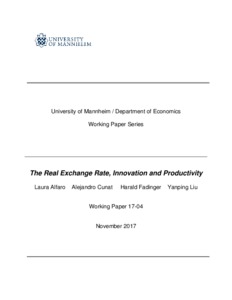|
The real exchange rate, innovation and productivity
Alfaro, Laura
;
Cunat, Alejandro
;
Fadinger, Harald
;
Yanping, Liu
![[img]](https://madoc.bib.uni-mannheim.de/43163/1.hassmallThumbnailVersion/17-04_Alfaro%2C%20Cunat%2C%20Fadinger%2C%20Liu.pdf)  Vorschau |
|
PDF
17-04_Alfaro, Cunat, Fadinger, Liu.pdf
- Veröffentlichte Version
Download (846kB)
|
|
URL:
|
https://ub-madoc.bib.uni-mannheim.de/43163
|
|
URN:
|
urn:nbn:de:bsz:180-madoc-431634
|
|
Dokumenttyp:
|
Arbeitspapier
|
|
Erscheinungsjahr:
|
2017
|
|
Titel einer Zeitschrift oder einer Reihe:
|
Working Paper Series
|
|
Band/Volume:
|
17-04
|
|
Ort der Veröffentlichung:
|
Mannheim
|
|
Sprache der Veröffentlichung:
|
Englisch
|
|
Einrichtung:
|
Fakultät für Rechtswissenschaft und Volkswirtschaftslehre > Internat. Handel, Makroökonomik, Entwicklungsökonomik (Fadinger 2014-2024)
|
|
MADOC-Schriftenreihe:
|
Department of Economics > Working Paper Series
|
|
Fachgebiet:
|
330 Wirtschaft
|
|
Fachklassifikation:
|
JEL:
F , O,
|
|
Freie Schlagwörter (Englisch):
|
real exchange rate , firm level data , innovation , productivity , exporting , importing , credit constraints
|
|
Abstract:
|
We evaluate manufacturing firms' responses to changes in the real exchange rate (RER)
using detailed firm-level data for a large set of countries for the period 2001-2010. We
uncover the following stylized facts: In emerging Asia, real depreciations are associated
with faster growth of firm-level TFP, sales and cashow, higher probabilities to engage
in R&D and export. We find no significant effects for firms from industrialized economies
and negative effects for firms in other emerging economies, which are less export-intensive
and more import-intensive. Motivated by these facts, we build a dynamic model in which
real depreciations raise the cost of importing intermediates, but increase demand and the
profitability to engage in exports and R&D, thereby relaxing borrowing constraints and
enabling more firms to overcome the fixed-cost hurdle for financing R&D. We decompose
the effects of RER changes on productivity growth into these channels and explain regional
heterogeneity in the effects of RER changes in terms of differences in export intensity,
import intensity and financial constraints. We estimate the model and quantitatively evaluate
the different mechanisms by providing counterfactual simulations of temporary real
exchange rate movements. Effects on physical TFP growth, while different across regions,
are non-linear and asymmetric.
|
 | Dieser Eintrag ist Teil der Universitätsbibliographie. |
 | Das Dokument wird vom Publikationsserver der Universitätsbibliothek Mannheim bereitgestellt. |
 Suche Autoren in Suche Autoren in
Sie haben einen Fehler gefunden? Teilen Sie uns Ihren Korrekturwunsch bitte hier mit: E-Mail
Actions (login required)
 |
Eintrag anzeigen |
|
|



 Suche Autoren in
Suche Autoren in